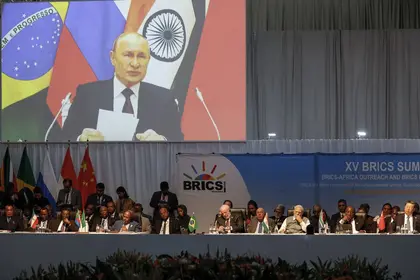The BRICS bloc agreed during its August meeting in Johannesburg to admit Saudi Arabia, Iran, Ethiopia, Egypt, Argentina and the United Arab Emirates with new membership in effect from Jan. 1, 2024.
The decision to expand membership, for the first time in 13 years, was aimed at reordering what they saw as an outdated US-led world order. They also left the door open for future expansion claiming that dozens more countries voiced interest in joining the group.
JOIN US ON TELEGRAM
Follow our coverage of the war on the @Kyivpost_official.
South African President Cyril Ramaphosa, who chaired the three-day leaders’ summit said about the enlargement that “BRICS has embarked on a new chapter in its effort to build a world that is fair, a world that is just, a world that is also inclusive and prosperous.”
“This membership expansion is historic,” Chinese President Xi Jinping, who had long pushed for enlargement, said. “It shows the determination of BRICS countries for unity and cooperation with the broader developing countries.”
The four original members Brazil, Russia, India, and China, which between them represented almost a quarter of the global economy, got together as an informal four-nation club in 2006, adopting the BRIC acronym that had been coined by the economist Jim O'Neill in 2001 before establishing it formally in 2009. South Africa joined in September 2010, leading to the bloc being renamed BRICS.
Russian President Vladimir Putin confirmed the milestone had been reached on Tuesday and stated that Russia will accept the BRICS chairmanship in 2024 intent on developing positive and constructive cooperation with its members and other relevant countries.

Tracing Russian Footprints in Iran’s Nuclear Program
He claimed that the addition of new members indicated the growing influence and role of BRICS in international matters. He also noted the increasing number of supporters and countries sharing the bloc's principles, with a future intention of creating a BRICS partner category to develop political, security, economic, financial, cultural and humanitarian interaction.
Initially, Argentina was also set to join the bloc this January, however, President Javier Milei decided against it in November.
Prince Faisal bin Farhan announcing Saudi Arabia’s accession to the bloc had said the BRICS group was “a beneficial and important channel” to strengthen economic cooperation. Saudi Arabia’s entry comes at the same time as growing geopolitical tensions brought about by Russia’s war in Ukraine and those between the US and China.
There has been an expansion of China’s influence within the region as both the UAE’s and Saudi Arabia’s biggest oil customer. Despite their continued strong ties with the US, the two nations have grown increasingly concerned that Washington is less committed to Middle East security than in the past.
United Nations Secretary-General Antonio Guterres echoed BRICS' longstanding calls for reforms of the UN Security Council, International Monetary Fund (IMF) and World Bank after attending the August meeting.
“Today’s global governance structures reflect yesterday’s world,” he said. “For multilateral institutions to remain truly universal, they must reform to reflect today's power and economic realities.”
BRICS has long been criticized for failing to live up to its grand ambitions and has, by and large, failed to disengage from the US dollar as its New Development Bank, has struggled in the face of sanctions against Russia.
Brazil and India have both also been forging closer ties with the West and Brazil’s President Lula has rejected the idea that the bloc should become a rival to the United States or G7 economies and saw no contradiction in bringing in Iran into the club despite its antipathy toward the US.
He said, “We can’t deny the geopolitical importance of Iran and other countries that will join BRICS,” before saying “What matters is not the person who governs but the importance of the country.”
You can also highlight the text and press Ctrl + Enter






